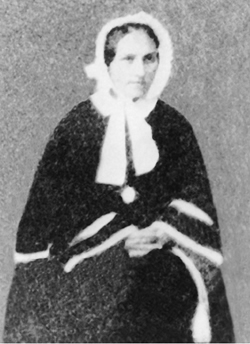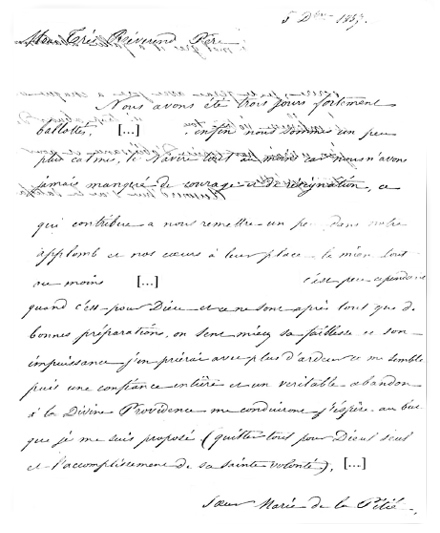06/11/2025
Needs of the Church, the Congregation and the world
06/11/2025
Prayer Intentions of the Pope
06/11/2025
Needs of the Church, the Congregation and the world
06/11/2025
Prayer Intentions of the Pope
04/09/2025
Needs of the Church, the Congregation and the world
04/09/2025
Needs of the Church, the Congregation and the world
04/09/2025
Prayer Intentions of the Pope






Our pioneers | The Vocation of the Pioneers
 Sister Marie de la Pitié emerges from her letters that have come down to us and from those of others who write of her, as a woman of prayer, a woman who stated her goal was “to leave all for God alone and the accomplishment of his will” (Pitié-Favre, 05.12.1857, Letter 2, §4, OPS I, 48). This goal, referred to often, seems to have given a certain perspective to her missionary life. She expresses the hope that “the goal for which we came will be accomplished for the glory of God” (Pitié-Poupinel, 23.06.1859, Letter 11, §5*).
Sister Marie de la Pitié emerges from her letters that have come down to us and from those of others who write of her, as a woman of prayer, a woman who stated her goal was “to leave all for God alone and the accomplishment of his will” (Pitié-Favre, 05.12.1857, Letter 2, §4, OPS I, 48). This goal, referred to often, seems to have given a certain perspective to her missionary life. She expresses the hope that “the goal for which we came will be accomplished for the glory of God” (Pitié-Poupinel, 23.06.1859, Letter 11, §5*).
A Lyonnaise, she was one of the first departure group who responded to the call of Bishop Bataillon for volunteers for Oceania. After being accepted as a member of the TOM, she set sail from London for Sydney with Srs Marie de la Miséricorde and Marie de la Sainte-Espérance. They were all assigned to Futuna where they arrived in May 1858.
Marie de la Pitié seems to have often regretted her lack of formation, including certain skills like sewing etc. She had her times of disillusionment, loneliness, lack of energy and vitality, feeling her life was useless (cf. Pitié-Bioletti, 20.10.1860, Letter 20, §3*). Tending to view herself as less than adequate, she probably suffered from poor self-esteem. However, it is remarkable how she balances this lack of self-confidence with great confidence in Jesus and Mary. Nor did it keep her from accomplishing much for the women and children of Futuna.
In her letters, there is a strong eschatological sense. She writes of earth as “the land of exile,” heaven as the “eternal homeland”. She communicated something of this “spiritual homelessness” to her family and friends when she writes “of the beautiful day when we will be all reunited in a blessed eternity,” and of “awaiting our glorious meeting again in the celestial homeland” (Pitié-Maillet, 26.06.1861, Letter 23, §9*).
She expresses joy in her vocation, believing her group “privileged by the good God,” (Pitié-Bioletti, 18.11.1857, Letter 1, §10, OPS I, 43), and happiness “with the choice God made in favour of me” (Pitié-Saunier, 07.04.1858, Letter 5, §2). Like her two companions, she ardently desired the religious life. In March 1869 after a novitiate in Futuna, she made profession in the congregation of Our Lady of the Missions with Marie du Mont Carmel. In February 1874, Marie de la Pitié left Futuna with Marie Rose, as Bishop Bataillon decided there would be no more sisters there. After participating in the provincial chapter in Apia, she went with the Sisters of Our Lady of the Missions to Tonga. Adaptation there was very hard. On learning of the difficulties between the congregation of Our Lady of the Missions and the Society of Mary, two of her companions decided in 1878 to join the Sisters of Our Lady of Oceania, recently founded in Samoa.
Marie de la Pitié herself also withdrew from the congregation that same year. In 1880 when Marie des Anges, left her to continue with the Sisters of Our Lady of the Missions in New Zealand, Marie de la Pitié gave her the symbols of her belonging - rosary, cross and ring - to be returned to the congregation. She wrote to the superior general: “Since we are now no longer in uncertainty, I am leaving the institute, because it has left me and I cannot follow it” (Pitié-Marie du Coeur de Jésus, 18.05.1880, Letter 70, §4, OPS IV, 758). She looked forward with joy to making profession in the newly-erected TORM and took perpetual vows in it in 1881 in Tonga, where she remained until her death in 1894.

We have been severely tossed about for three days… Well, now we are a bit calmer, the ship at least, for we never lost courage and resignation, which helps us to regain our balance and keep our hearts in the right place, mine at least… It is a small thing, however, when it is for God, and this, after all, is only a good preparation; we feel our own weakness and helplessness more. I think I will pray with greater fervour and with complete confidence and real abandonment to Divine Providence who, I hope, will lead me to the end I have in view: to leave all for God alone and the accomplishment of his holy will, […] (Pitié-Favre, 5.12.1857, OPS I, 48).